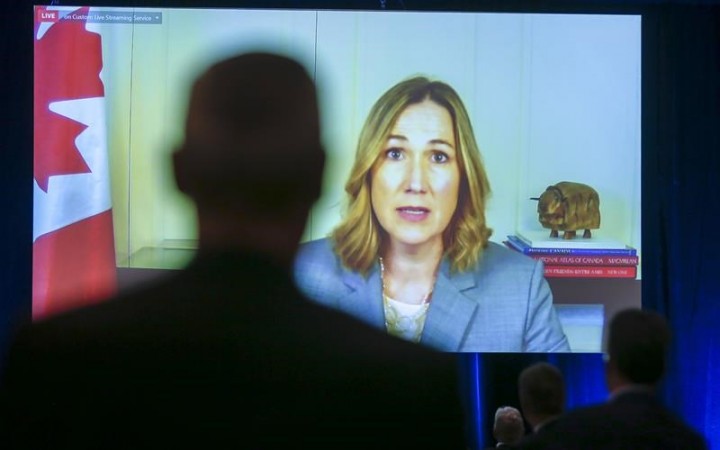WASHINGTON — The Nexus trusted-traveller program is being “held hostage” by unilateral American efforts to renegotiate the 20-year-old preclearance agreement between the United States and its northern neighbour, Canada’s envoy to the U.S. said Thursday.
Kirsten Hillman called it “disappointing” and “frustrating” that Canada’s 13 Nexus enrolment centres remain closed, even with those south of the border open since April — and she laid the blame squarely at the feet of the U.S.
“There’s an attempt to renegotiate the terms of a 20-year-old program unilaterally and the program is being held hostage to that effort,” Hillman told a symposium on the Canada-U.S. border hosted by the Future Borders Coalition.
The tactics being used by the U.S. are “heavy-handed” and not in keeping with what has otherwise long been a cordial and co-operative relationship with Canada, she continued.
“There needs to be a recognition that we will work on the challenges, but we can’t have the whole program sort of on its knees until we work those through because it’s going to take some time.”
The nucleus of the dispute has been largely opaque for months. But it revolves around a long-standing request by the U.S. Customs and Border Protection agency that its agents be afforded the same legal protections inside Nexus facilities in Canada that they currently have at ports of entry like airports and the Canada-U.S. border.
Hillman, whose self-described “super-undiplomatic and blunt” message came during an unscheduled second appearance onstage at the Canadian Embassy, said she’s seen a legal opinion suggesting the U.S. demands are impossible to meet.
The only path out of the dispute will have to include a recognition from the U.S. “that what is being requested is not simple — and may not be possible,” she said, intimating that the future of Nexus could be at stake.
“We can’t just let the whole program fall apart based on a request that is maybe not possible.”
Public Safety Minister Marco Mendicino has cited the principles of Canadian sovereignty in explaining why U.S. customs officers can’t have the same legal protections at the Nexus centres that they do at airports and the border.
It’s easier to manage preclearance areas at ports of entry because travellers there are moving directly into the U.S., unlike at the Nexus enrolment centres in Canada.
But Scotty Greenwood, chief executive of the Canadian American Business Council, has been arguing for weeks that Canada already has the power to determine and redefine preclearance zones.
“I can’t figure out what the motivation is, unless it’s simply to try to blame the United States for your own inadequacies,” she said.
“Blaming the United States for your own lack of desire to facilitate the Nexus program — that’s not being straightforward, that is not operating from a position of goodwill. That’s not operating from a position of facts.”
The dispute is only the latest irritant to come up between Canada and the U.S. since Joe Biden took over the White House in 2021. But it is the first to showcase such undiplomatic rhetoric.
The two countries have exchanged formal complaints over a number of trade-related issues in the last two years, and Canada lobbied aggressively against a now-defunct incentive scheme for electric vehicles that would have excluded Canadian-made cars.
But observers have noted that since border restrictions imposed during the COVID-19 pandemic began to ease last year, the two countries began taking a more asymmetrical approach to the shared border than before.
Indeed, while Canada abandoned its vaccination requirement for foreign visitors earlier this month, the U.S. has yet to take similar steps with regards to Canadians travelling south.
“Nexus, in some ways, is emblematic of the special nature of Canada-U.S. co-operation that we’ve seen eroded in recent years,” Greenwood said.
“Nexus is on life support right now, and the Canadian government appears to be deciding to pull the plug instead of save the patient. And that will have repercussions.”
Justin Trudeau struck a decidedly more docile tone Thursday when asked during an event in Hamilton about Hillman’s broadside. The two sides are in talks “almost every day,” the prime minister said.
“We’re going to continue to work with them on ways to make it smoother and more effective for people who work on both sides of the border,” Trudeau said.
“That’s why the trusted-traveller programs like Nexus are so important and why we’re so eager to get it rolling again.”
This report by The Canadian Press was first published Oct. 13, 2022.
James McCarten, The Canadian Press
